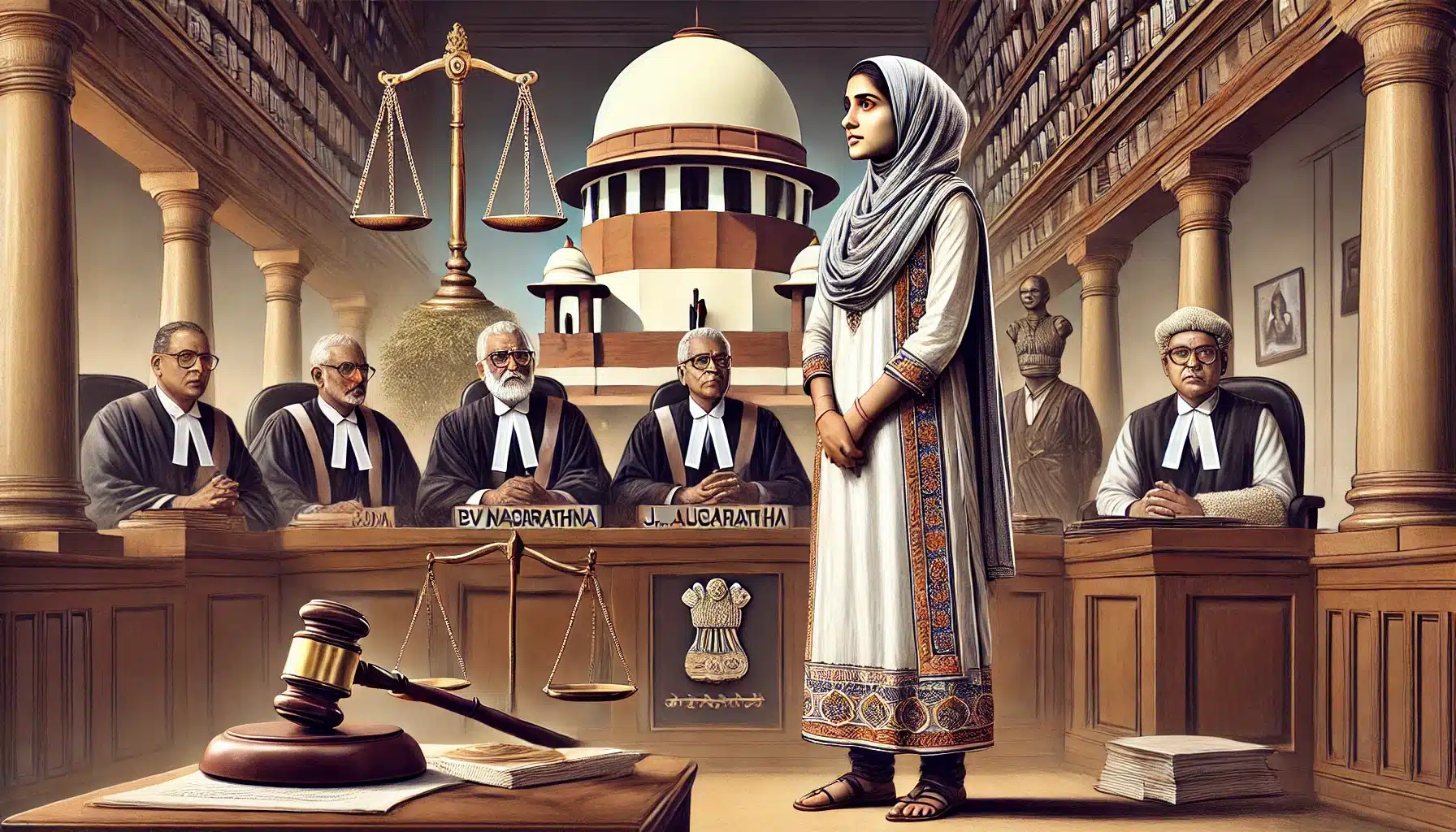The Supreme Court has stayed a Mumbai college’s directive banning the wearing of hijabs, caps, and badges on campus. The interim order was issued following a petition by three Muslim women students challenging the Bombay High Court’s decision that upheld the ban. The court expressed surprise at the

In a significant development, the Supreme Court on Friday, August 9, issued a stay on an instruction from a private college in Mumbai that prohibited students from wearing hijabs, caps, or badges on campus. The interim order was passed during the hearing of a petition filed by three Muslim women students from NG Acharya & DK Marathe College in Mumbai. These students had approached the Supreme Court after the Bombay High Court upheld the college’s directive, which they argued infringed on their fundamental rights.
Supreme Court’s Interim Order:
- Stay on Ban:
- The Supreme Court stayed the enforcement of the college’s instruction, which banned the wearing of hijab, caps, or other religious identifiers on campus.
- The court was hearing a petition filed by three Muslim women students challenging the Bombay High Court’s judgment that had upheld the college’s instructions.
- Judicial Concerns:
- A bench comprising Justices Sanjiv Khanna and Sanjay Kumar expressed surprise and concern over the college’s reasoning that the rule was imposed to prevent the revelation of a student’s religion.
- Justice Khanna questioned, “What is this? They will not reveal their religion? Don’t impose such a rule,” pointing out that names themselves could reveal religious identity.
- Justice Kumar added, “Won’t their names reveal their religion? Will you ask them to be given numbers so that they are not addressed by name?”
- College’s Defence:
- Senior Advocate Madhavi Divan, representing the college, argued that the institution was a private unaided entity, functioning since 2008. However, Justice Kumar criticized the timing of the rule, remarking, “It’s unfortunate that you come up with such instructions after so many years of independence… suddenly you realise that there is religion.”
- Divan further submitted that 441 Muslim women students were “happily attending” the college and the objection was raised by only a few. Justice Khanna responded, “They must study together.”
- Student Situation:
- The court was informed that the three petitioners had switched to another college and that students had not always worn the hijab. In response, Justice Khanna expressed sadness, stating, “That is sad… How are you empowering women by telling them what to wear?”
- Justice Kumar questioned, “Will it not be up to the girl what she wants to wear?”
- Justice Khanna emphasized the importance of understanding the cultural background of students, noting, “Family members may say wear it and go and they have to wear.”
- The bench made it clear, “Don’t ask them to leave the college. Will stay the circular…Solution to a lot of this is proper good education.”
- Limits of the Stay:
- Divan raised concerns about the possibility of misuse of the stay order, particularly regarding face-covering veils like nakabs or burkhas. The bench agreed that face-covering veils could not be allowed in class and did not interfere with the part of the college’s instructions prohibiting the use of nakab.
- The Supreme Court issued notice on the petition, making it returnable in the week commencing from November 18. The bench clarified that the stay should not be misused and allowed the college authorities to seek modification of the order if there is any misuse.
Background and Legal Context:
- Bombay High Court Judgment:
- On June 26, the Bombay High Court dismissed petitions filed by nine female students challenging the dress code enforced by NG Acharya & DK Marathe College. The dress code prohibited students from wearing hijabs, nakabs, burkhas, stoles, caps, and other religious identifiers on campus.
- A division bench of Justices AS Chandurkar and Rajesh S Patil supported the college’s dress code, stating that the objective was to prevent the revelation of a student’s religion and maintain discipline and uniformity.
- The High Court remarked, “The object behind prescribing the dress code is evident from the Instructions since they state that the intention is that a student’s religion ought not to be revealed. It is in larger academic interest of the students as well as for the administration and discipline of the College that this object is achieved.”
- Reference to Karnataka High Court Ruling:
- The Bombay High Court referred to the Full Bench decision of the Karnataka High Court in Resham v. State of Karnataka, which upheld a government order excluding hijabs as part of the prescribed dress code in educational institutions. The Bombay High Court agreed with the view that a dress code is intended to achieve uniformity among students and avoid the disclosure of religious identity.
- The petitioners, who are pursuing their second and third-year undergraduate courses, challenged the dress code on the grounds that it violated their fundamental rights, including the right to choose their attire, the right to privacy, the right to expression under Article 19(1)(a), and the right to freedom of religion under Article 25 of the Constitution.





